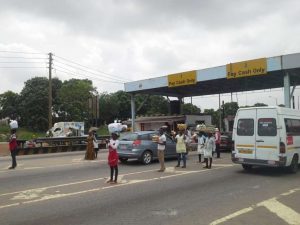A promise by the opposition National Democratic Congress, NDC, to scrap a new law passed by the incumbent government to ban the importation of salvage cars and second hand cars of not more than years old, has rekindled the already existing protest against the law.
In response to the NDC Manifesto promise however, the Automobile Dealers Union of Ghana, Abbosey Okai Spare Parts dealers, and some mechanics, say they prefer a review of portions of the law or a complete scrapping if that cannot be done.
As part of its transformational agenda, the government identified Vehicle Assembly and Automotive Components Manufacturing as a strategic anchor industry that will promote economic development in the country and provide incentives for auto manufacturers.
The government launched the Ghana Automotive Development Policy in August 2019 to promote the manufacture of automobiles for both the domestic market and the West African sub-region.
The amendment is part of a bigger plan towards the implementation of the Ghana Automotive Manufacturing Programme, which has so far attracted several global car assembly plants into the country.
Subsequently, parliament passed the Customs Amendment Bill, 2020 to ban the importation of salvage cars also known as accident cars, as well as second hand vehicles of more than ten years old.
Currently, majority of cars driven on Ghana’s highways are mostly in this category, and they come at a cheaper cost.
Data available from the Ghana Revenue Authority Customs Division indicates that between 2005 and 2016, more than 1 million vehicles were imported into the country, representing an average of 100,000 cars per year. Out of this figure, 80 percent were second-hand vehicles.
According to the Abossey Okai Spare Parts Dealers Association, government has assured the various stakeholders that it is holding on with the implementation of the law. In an interview with Citi Business News, Co-chairman of the Association, said the Ministry of Trade and Industry after talks with the stakeholders promised to suspend the implementation.
“In our last meeting with the Ministry of Trade, we were given assurance that the implementation of the law which was supposed to take effect on November 1st, has been put on hold due to the agitations surrounding it”.
He however explained that spare parts dealers were not completely against the law, except that they have concerns about the definition of salvage cars.
“With the banning of the ten-year old cars, all the stakeholders don’t have a problem with it because we all aspire to the industrialization of the country, but we have issues to do with the definition salvage. We are of the view that if a car has been involved in an accident and the damage is very minor then it should be allowed into the country”.
Former President and 2020 Flagbearer of the NDC, John Mahama, has fueled the debate following a pledge to scrap the law during the launch of his party’s manifesto on Monday September 7.
Secretary of the Automobile Dealers Union. Clifford Ansu, who spoke to Citi Business News said if the incumbent government does not address its concerns with the law, they will support the NDC’s pledge to scrap it completely.
“We are asking government to scrap the areas of the law we do not agree with such as the increase of the import duty from 5 to 35 percent. if this cannot be done then we are in full support of what Mahama said during the NDC’s manifesto launch to completely scrap the law”
A Mechanic, who has been in the business for 25 years, Mr. Emmanuel Addo, also told Citi Business News the law must be implemented gradually until such a time that Ghana can fully assemble cars locally to meet demand.
“Such a law cannot be implemented at once. It should be done gradually so that as we assemble enough cars in the country to meet the demand, old cars will gradually fade out because I do not think anybody in the country would want to buy old cars when there are enough and affordable new cars on the market”
Source: Citibusinessnews.com







